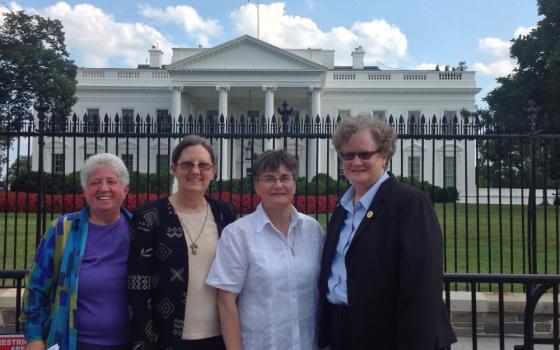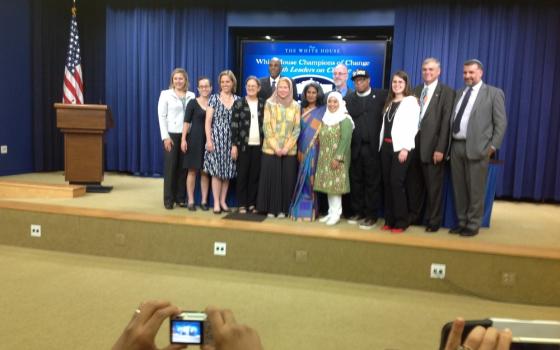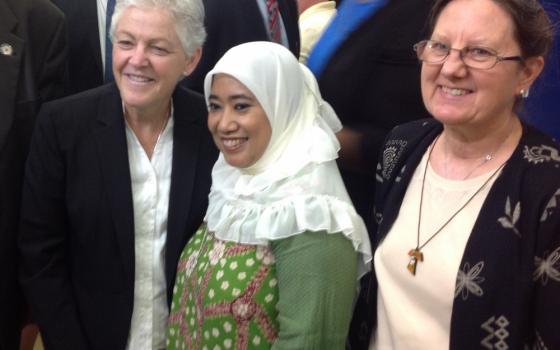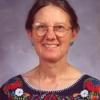As I watered the beans and pick squash, tomatoes and basil, I thought, “I really would just like to be in the quiet of this summer garden and not go to Washington, DC in the morning.”
But, the next day while the Big Dipper is still visible in the sky, I awoke to catch a very early morning flight out of Albuquerque for our nation’s capital. I was one of 12 faith leaders traveling to the White House to receive a Champion of Change award for work on climate change on July 20.
I must admit that I was very humbled and overwhelmed by the honor and said “Yes” to increasing my carbon footprint with a flight because I wanted to honor the other 12 faith leaders. I also believe this kind of recognition is an honoring of all who are working so hard for creation and for our brothers and sisters suffering most whose voices are muffled by consumerism and what Pope Francis in Laudato Si ‘ calls the victims of “a throwaway society.” Ultimately, raising up the work lifts the visibility of climate change as an ethical and moral concern for which we all have an active part in addressing.
After living with this award for several weeks now, I have many reflections.
It was a wonderful gift to be with other faith leaders from the Hindu, Muslim, Evangelical Christian, Protestant, Jewish and Catholic traditions giving their talents, convictions and unique voices to the world. There is an important moral, ethical and spiritual role that people of all religious traditions offer. The world is looking for a deep hope, which I felt in the embraces of joy amidst the struggle at the White House event.
The presentations of White House staff, including by EPA Administrator Gina McCarthy, were inspiring and highlighted the voice of Pope Francis, the new encyclical and the imperative to act now. Having worked on the concern of climate change for more than two decades, I was grateful for the presentation by Jonathan Reyes, executive director of the USCCB Department of Justice, Peace and Human Development.
“This is not the time, in the vision of the Holy Father and the U.S. Bishops, to revisit the well-worn arguments that have made real conversation about the climate near to impossible of late,” he said. “We have to be honest about what we are facing, what the various options are in response to these challenges, what we are truly willing to do, where we are willing to make compromises, and, perhaps most importantly, the real reasons why we disagree.”
The pope and the bishops have been honest. They acknowledge that they speak as pastors, not scientists, politicians or policy makers. But they have also insisted that the conversation has to go beyond the narrow interests of partisan politics, beyond an exclusive focus on economic interests, and beyond all ideologies that do not serve the common good. (Laudato Si’ 188)
On a personal level, I was very moved to have sister companions for my three allowed guests: Mercy Sr. Marlene Perrotte , with whom I share community and who does legal work with immigrant women and children; Mercy Sr. Cathy Darcy, who is in Mercy leadership for the Northeast; and Franciscan Missionaries of Mary Sr. Odile Coirier, with Franciscans International at the United Nations. In joining me for the day, they reminded me again of how broad and deep sisterhood is in our shifting age.
Probably the most profound learning is one of humility and realizing our oneness. So many people of faith, Native Americans, friends, environmentalists, my Franciscan community, sisters from other communities and my family offered congratulations. Of significance is that they say, “She is one of us,” or, “We work together,” or simply as my Down Syndrome sister Carol beamed, “my sister.”
Just as an injury to one is an injury to all, so is an honoring of one an honoring of all. The words of my favorite poem “Beginners” by Denise Levertov come to heart:
We have only begun to know
the power that is in us if we would join
our solitudes in the communion of struggle.
So much is unfolding that must
complete its gesture,
so much is in bud.
I have been back in New Mexico for several weeks now. The daily work reminds me that so much is yet undone and so much is unfolding that we must complete for the children of all species. And, the tomatoes, basil, beans, squash, peaches and everyone, except maybe the snails, are happy I am back. I am grateful for their wordless wisdom as an integral part of the communion of struggle.
[Sr. Joan Brown, OSF, is a Franciscan sister from the Franciscan Sisters of Rochester, Minnesota, and executive director of New Mexico Interfaith Power and Light.]



